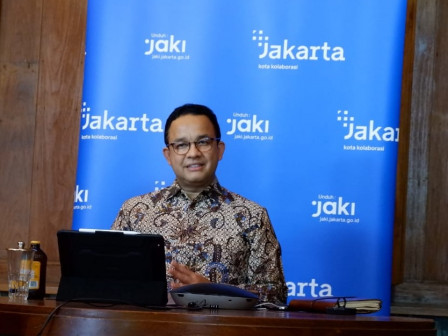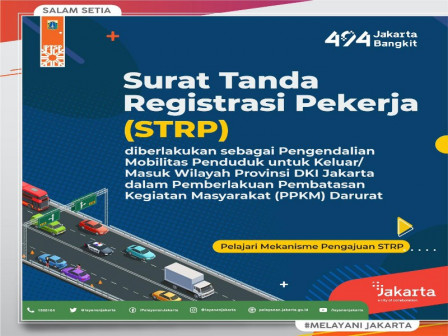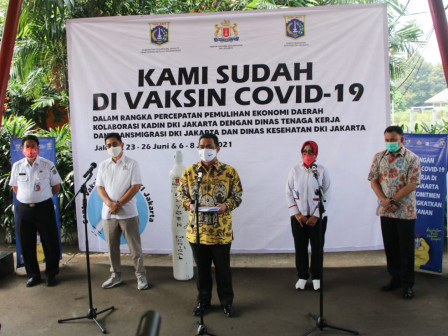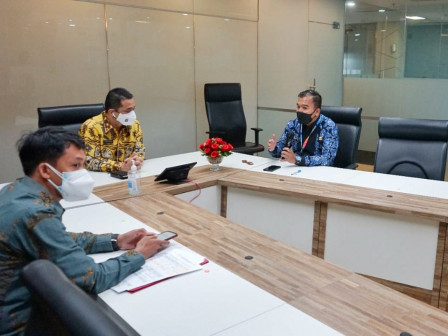Half of Jakarta Population Detected Having COVID-19 Antibody, Collaborative Serological Survey Result Says
Reported by Wuri Setyaningsih | Translated by Maria Inggita
In setting up strategy to handle and control COVID-19 outbreak, Jakarta Government through Jakarta Health Agency collaborated with FKM UI's Pandemic Team, Eijkman Institute, and CDC Indonesia to conduct serological survey in the capital city. This survey aims to measure proportion of Jakarta residents who have antibody to COVID-19.
From this survey, we can estimate proportion of Jakarta residents who have been infected by SARS CoV-2 virus
Jakarta Health Agency Head, Widyastuti explained that serology is an immunology-based technique to measure immune response to an antigen from person's blood preparation. If a person has been exposed to certain infectious agents, body will be triggered to produce specific antibodies that can be detected.
"From this survey, we can estimate proportion of Jakarta residents who have been infected by SARS CoV-2 virus, whether identified/confirmed by PCR test or not. We can also see a more complete picture of pandemic situation in Jakarta. Thus, COVID-19 handling and control strategy can be adjusted," she explained in Dissemination of COVID-19 Serological Survey Result Press Conference which held online on Saturday (7/10), as quoted from Jakarta PPID Press Release.
Jakarta Receives Support for Handling Covid-19 Worth Rp 2 BillionFurthermore, epidemiologist from FKM UI Team, Pandu Riono explained, it was seen from the result of this survey that almost half of Jakarta's population had been infected with COVID-19, most of them aged 30-49 years. Infection in female group was higher (47.9%) and unmarried group had lower risk of infection (39.8%).
"People in densely populated areas are most susceptible to COVID-19 infection (48.4%). The higher body mass index, the more people infected, in this case overweight (52.9%) and obese (51.6%). People with high blood sugar level are also more at risk," he conveyed.
He explained that prevalence of population who had been infected reached 44.6% with estimated population 4,717,000 people from total Jakarta population 10,600,000 people. From estimated number of residents who had been infected, only 8.1% were confirmed. Most of people who had been infected went undetected. Besides, most people who were infected, whether detected or undetected, didn't experience any symptoms.
"Herd immunity in Jakarta will be more difficult to achieve because Jakarta is a open city with high intra and inter-regional mobility. Consequently, all residents who are active in Jakarta, both Jakarta residents and migrants, must have immunity (have been vaccinated) to overcome all variants of virus," he said.
He assessed that it is still possible that the pandemic will become endemic and need a fast and significant pandemic handling strategy in a short term, as well as anticipation in medium and long term. Because, as it is known, vaccination can reduce the risk of hospitalization and risk of death, although it can't stop transmission completely.
For this reason, Jakarta Government will strengthen 3T (Testing, Tracing, Treatment) to control the pandemic, in addition to continuing to accelerate vaccination for all residents. However, residents must also get used to being able to assess risks and maintain healthy lifestyle with 5M habits thus they are ready to carry out productive activities amidst the long-term threat of COVID-19 endemic, and surely to take vaccination immediately.
Jakarta Governor, Anies Baswedan also emphasized that Jakarta Government from beginning used scientific approach from scientists in their fields as the basis for making decisions and handling COVID-19 pandemic in Jakarta. Therefore, he expressed his gratitude and appreciation to many parties involved, including FKM UI, Eijkman Institute, CDC Indonesia, and others.
"We, in DKI Jakarta, since beginning of pandemic have entrusted policy direction to scientific approach and scientists in their fields. We use reference from data, scientific approach, and transparency is the key word that we hold from the start. Thus in every aspect of policy, we always consult, exchange ideas," he explained.
"Let me express my gratitude to FKM UI team who have been on this journey for a year and half to assist, provide guidance, in navigating us to face COVID-19 pandemic. We will continue to adhere to this principle, use scientific approach and always be transparent, because we believe this situation will be not resolved in a matter of weeks. In order to work together, people must trust government and government should be a party that can be trusted by conveying the reality and conveying it on the basis of evidence using scientific method," he added.
According to him, COVID-19 handing and development of COVID-19 pandemic in Jakarta can be reference for other regions and even other cities in the world. For this reason, Jakarta Government will fully support various scientific methods, including research, surveys, and data collection at micro level.
"We will be all out to support clinical trial surveys, research, and anything related to COVID-19 in Jakarta. In fact, we even mobilized our ranks in regions to take a part in data collection. This survey is not the first time we have conducted, in fact, we also carry out surveys with institutions outside Indonesia, universities that conduct research, as well as friends who have think tanks related to COVID-19, we always provide access and support," he stated.
"Several studies on COVID-19 in Jakarta have been published in international journals and have become feedback from other countries. Why is it done? Jakarta must be a local player, Jakarta must be role model internationally. This is the largest megapolitan city in southern hemisphere of the world and have enough experience to be a lesson to international world. So, we are at the global level not only to absorb information, but on the contrary we provide information, provide experience and can be a reference," he said.
For information, serological survey was carried out using population-based sampling method within March 15-31, 2021 period. The survey was conducted in 100 urban villages in 6 municipalities and region, covering 4,919 samples aged >1 years (98.4%) from total 5,000 target samples, consisting 54% women and 46% men, with age groups of 1-14 years (21.6%), 5-49 years (52%), 50+ years (26.4%).





